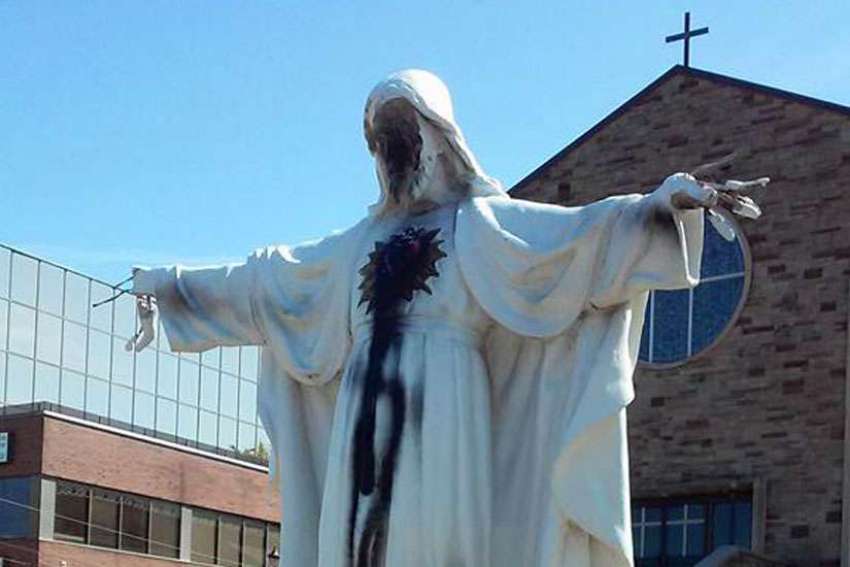Sacred Heart of Jesus statue outside Mississauga was desecrated in Ont.’s St. Catherine of Siena Church in 2015, investigated by the police as a hate crime.
Photo by Michelle Medeiros
Canada’s hate crimes a growing concern
By Michael Swan, The Catholic Register
The latest number of police-reported hate crimes in this country is small, but that shouldn’t be comforting news to Canadians.
“We like to hold on to the notion that Canadians value something called multiculturalism or pluralism,” said Pamela Divinsky, executive director of The Mosaic Institute, a think tank that promotes dialogue within diverse communities. “But there is growing discomfort with differences.”
There was a three-per-cent uptick in hate crimes in 2016 compared to 2015, for a total of 1,409 hate crimes over 12 months. The reported crimes specifically targeted religions, racial and ethnic minorities or gays, lesbians and transgendered people.
That represents less than 0.1 per cent of all crime, but statisticians warn that hate crimes are very likely to be underreported.
Officially reported and recorded hate crimes “probably reflects even less than five per cent of discriminatory behaviours,” said Divinsky.
Race and ethnicity accounted for nearly half (48 per cent) of hate crimes, with South Asians, West Asians and Arabs increasingly targeted and black Canadians still the number one target. Black Canadians are victims in 15 per cent of all hate crimes.
Religion is the motivating factor in one-third of all hate crimes, with 460 criminal acts directed at religious people or places. As in every survey that has ever been taken on the subject, Canadian Jews remain the number one target for religious hatred. Even though they represent just one per cent of Canada’s population, Jews are the victims in 16 per cent of all hate crimes and 48 per cent of all religiously motivated hate crimes.
Muslims are increasingly targeted and now absorb 10 per cent of hate crimes in general and 30 per cent of religiously motivated hate crimes. Reported attacks on Muslims have risen 40 per cent since 2014.
Catholics, who are 39 per cent of Canada’s population, are victims in just two per cent of hate crimes and were targeted 27 times in 2016.
Sexual orientation sparked 13 per cent of Canadian hate crimes in 2016, but crimes against gays and other sexual minorities were the most violent. Seventy-one per cent of hate crimes directed against sexual minorities were violent, compared with 43 per cent of hate crimes in general that were classed as violent.
Year-over-year, violent hate crimes rose 16 per cent, from 487 violent incidents to 563.
“We should definitely be looking at ourselves and examining what our attitudes are to people who are different from ourselves,” said Archdiocese of Toronto ecumenical and interfaith affairs officer Fr. Tim MacDonald. “Not only in terms of sexuality, but also in terms of religion and ethnic background.”
Catholics have a wealth of Church teaching that condemns violence and contempt for others, MacDonald said.
“If you want to think about Pope Francis’ idea of developing a culture of encounter — well, he’s not talking about a culture of encounter with people who are the same,” MacDonald said.
Rather than suspicion or dismissal of customs, practices and people who are different, any Catholic must ask, “What can we learn from that culture that’s different from ours, and that religion that’s different from ours?” MacDonald said.
Religion has a key role to play in dismantling entrenched prejudice, said Divinsky.
“People don’t actually change their positions on any of this stuff through data or reason. Because this doesn’t operate in the reason territory. It operates in the emotional territory,” she said. “It would be nice if facts could dismantle those prejudgments, but they don’t.”
However, religious values and traditions can be brought to bear whenever people believe their identity is at stake.
“The commandment that is most repeated in the Old Testament is ‘love the stranger.’ So in the oldest book that is the basis of many religions, we are commanded to not be prejudiced. We are commanded to love the stranger,” Divinsky said.
When it comes to the violence and hatred directed at gays, religions need to carefully examine what they teach and how they teach it, said Divinsky.
“Bodies of religious doctrine absolutely create an us-versus-them,” she said.
Respect and tolerance are clearly part of what’s taught about religion and other issues in Catholic schools, but the challenge is in reprogramming the prejudices people pick up in their families, MacDonald said.
Tagged under:
Please support The Catholic Register
Unlike many media companies, The Catholic Register has never charged readers for access to the news and information on our website. We want to keep our award-winning journalism as widely available as possible. But we need your help.
For more than 125 years, The Register has been a trusted source of faith-based journalism. By making even a small donation you help ensure our future as an important voice in the Catholic Church. If you support the mission of Catholic journalism, please donate today. Thank you.
DONATE

